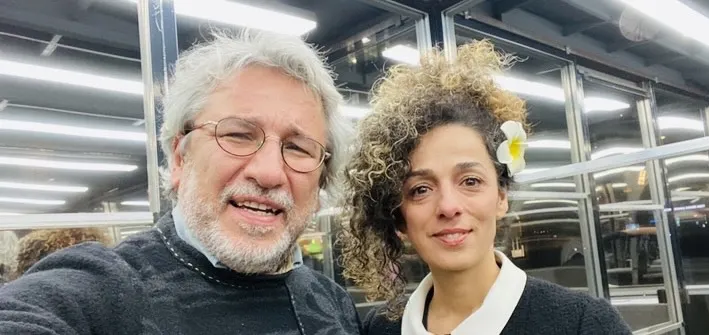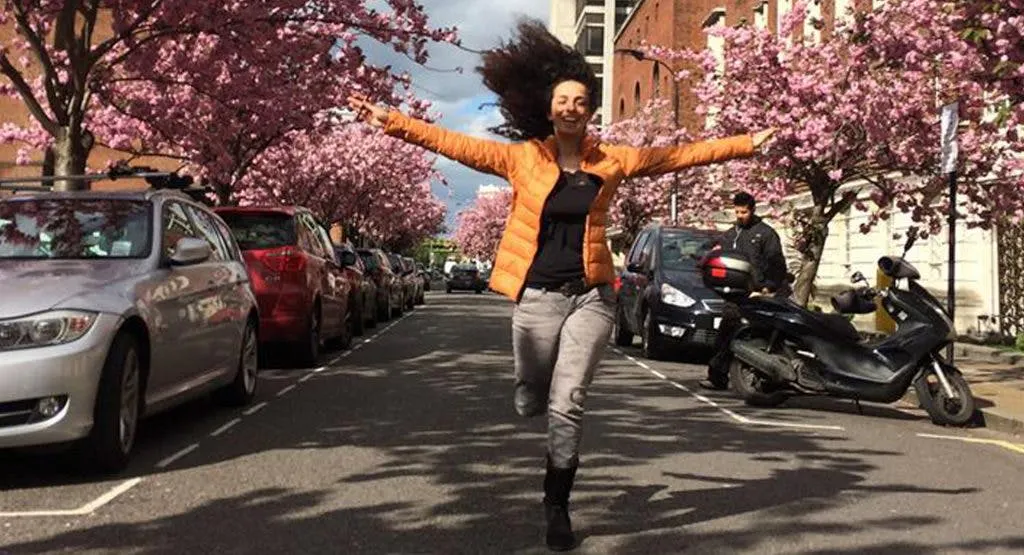03

Masih’s Flower
The first thing that you notice when you meet Masih – probably after her engaging smile – will be the flower tucked into the side of her hair.
Which is exactly what happened when we met in Amsterdam last year: my eyes were drawn to that enormous frangipani stuck into her luxuriant curls … Obviously a symbol of resistance for hair that had been denied the light or wind … A garden of freedom carried on her head, defying the orders to cover…
Ever since leaving her native Iran, Masih Alinejad has been fighting against the fanaticism that has locked Iranian women into a piece of cloth. She is not opposed to hijab as such, but to mandating it. As her social media accounts (Instagram (Öffnet in neuem Fenster) / Twitter (Öffnet in neuem Fenster)) reveal, she gives voice to a women’s rebellion. Women who have been arrested by the morality police, bruised by men or imprisoned by laws, for daring to uncover their heads speak out on her pages: ‘My body, my choice.’
I would later read in her book about the morning in cherry tree blossom time when she simply wanted to feel the spring: removing her headscarf, she released her hair into the wind. She shared the photo on her Facebook page; that rebellious wind inspired other women in her country. Countless others also released their hair into the wind.
She battles the darkness imprisoning her native country
I asked her where she had found the courage, and she told me about something that had happened when she was a child:
Six children had shared a room in the small, impoverished town in northern Iran where she grew up. They all lived, ate and slept in that one room. The outside toilet made going for a pee at night a true nightmare… ‘Darkness can only swallow you if you’re scared of it…’ said her mother, teaching her not to be afraid of the dark, ‘Open your eyes wide and face it.’
This piece of advice has been a guiding light for Masih ever since: opening her eyes wide, she battles the darkness imprisoning her native country. She is the one who intimidates the darkness. So unsettled was the Tehran regime by her campaign that it has made several attempts to kidnap her in exile… Yet, undaunted by the need for constant bodyguard protection, she continues to speak out…

Cherry Tree Blossom in the streets of London
Exiles recognise one another through their pain; it’s their wounds that bring them closer. Which is what happened with us; the moment we met, we started chatting like a brother and sister burning with the same homesickness.
Her Iran had been captured by the mullahs, and my Turkey, by those mimicking them… We talked of our distant homelands, those two neighbours, as well as the parents we had left behind, and our concerns and hopes for the future… Of her endeavours to gather all those who are uprooted…
Prejudices about their countries follow exiles wherever they go…
A waiter was serving wine as we continued to chat; on coming to our table, he hesitated. Did people from Muslim countries drink wine? Was there anything in the menu that went against the customs of the guests?
Prejudices about their countries follow exiles wherever they go… Even though some have defied the feudal culture imposed on their countries, fought fanaticism to secure their freedom, and so were excluded, punished, and forced to leave their soil. Unfortunately, they are never free from the yoke of that fanaticism in exile either… They are strangers not only in their own lands but also where they end up. This time they crash into a wall of perception. The ‘culture’ they had fled from is slapped on them.
The ‘your culture’ cliché won’t leave them alone anywhere… No amount of insisting ‘That’s not my culture; that’s the culture of the backwardness gripping my country… And I’m here because I oppose it,’ is any use; no one listens.
Masih is especially cross with Western female politicians who cover up on official visits to Tehran: this, she maintains, is a concession to the mullahs, and legitimises oppression. She criticises them for standing the wrong side of the struggle for freedom in Iran.
Political exiles could easily assume a significant role to combat this skewed perception of culture.
I have observed a similar approach in Germany. They boast of making a huge contribution to ‘our culture’ by building Europe’s biggest mosque in Cologne and inviting Erdoğan to open it. Our remark ‘If only you’d built a culture and arts centre of the same size next to it, or a library of exile literature!’ astonishes them. ‘That’s their culture,’ say schools, which turn a blind eye to Muslim parents refusing to send their daughters to swimming lessons; this delusion is defended ostensibly in the name of democracy, scared that any criticism will be seen as ‘Islamophobia’.
Political exiles could easily assume a significant role to combat this skewed perception of culture. Explain that opposing religious oppression does not necessarily mean being anti-Islam, that what is defended as ‘cultural tolerance’ has nothing to do with democracy, quite the opposite: that every concession is a blow to the struggle for freedom. Point out that concern with avoiding the ‘appearance of Islamophobia’ risks lowering those who are so concerned to the same level with political Islam.
Lend an ear to Masih who tells Western woman politicians, ‘By covering up before the mullahs, you’re casting a cloud over our struggle and legitimising the compulsory hijab.’
And take a good look at the flower she’s tucked behind her ear; it may have been plucked, but it’s still a fresh symbol of indomitability…
Writer, journalist and women’s rights activist Masih Alinejad was born in Iran in 1976. She was jailed at the age of 18 for her articles critical of the Islamic Republic. Having left Iran in 2009 to escape arrest, she now lives in New York. Her published books include the autobiographical The Wind in My Hair. Her Facebook page called My Stealthy Freedom (Öffnet in neuem Fenster) hosts thousands of photos of women who have removed their hijab in public. Alinejad was honoured with the Women’s Rights Award at the Geneva Summit for Human Rights and Democracy. In 2021, she faced a plot by Iranian intelligence officers to kidnap her between her home and the Brooklyn waterfront.
Her campaigns can be followed via the following: #MeninHijab, #WhiteWednesdays, #WalkingUnveiled and #MyCameraisMyWeapon
More information @ https://www.masihalinejadmedia.com (Öffnet in neuem Fenster)


